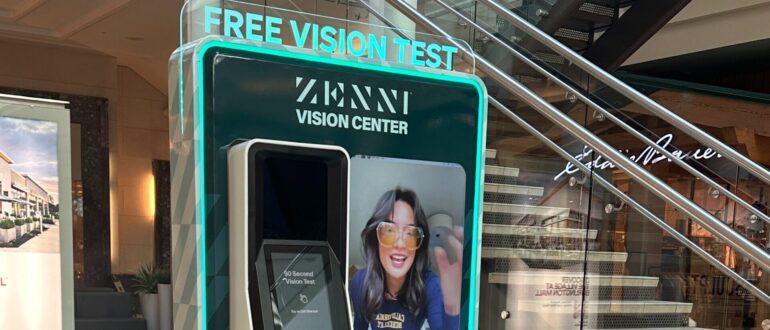
An automated eye test is getting plenty of gawkers at the CES 2025 conference in Las Vegas.
The fully autonomous, AI-powered kiosk is called Eyebot S1, and its inventor believes it addresses a major shortage of optometrists with a quick vision test in just 90 seconds, and prescribed lens in less than 15 minutes. The ATM-sized exam area is being deployed at retail giant Zenni Optical, where a procession of consumers are getting an eyeful of the technology.
“Our mission is to simplify and lower the barriers to vision care for everyone,” Eyebot CEO and founder Matthias Hofmann, said in an interview about the 4-year-old startup. “This eliminates the wait for a scheduled eye exam with a person, and accelerates the prescription of glasses. This is so important since more optometrists are retiring than coming out of school.”
The exam is quick and simple: A patient fills out a survey with their age and health history; they are given a standard letter test reading, followed by a brief eye scan while standing. Results are tabulated in a matter of seconds.
In October, Eyebot, which has developed automated vision testing technology, announced a strategic partnership with Zenni Optical, making 10 kiosks available in Massachusetts, New Hampshire and California, with more to come.
“By partnering with Zenni, we are not only providing quick and efficient vision tests but also ensuring that people can buy affordable eyewear immediately after their test,” Hofmann said. “This partnership is a significant step toward making vision care more accessible to everyone, especially in underserved communities.”
The company’s grand vision doesn’t end there. It’s also in discussions with retail outlets and makers of smart glasses about using its kiosk. Eventually, Eyebot hopes to expand the capability of its booth to perform retina scans and glaucoma tests.
“We’re convinced that optometry will become the first medical appointment that will become obsolete,” Hofmann said.
Indeed, Eyebot is but the latest medical procedure performed without a human touch as physical AI rapidly takes shape.
Last year, an AI-enabled robot from Perceptive, a tech company financially backed by Dr. Edward Zuckerberg, the dentist father of Mark Zuckerberg, performed the first dental procedure in Colombia. Under the procedure, a robotic arm, assisted by AI imaging software, quickly drilled into and shaved a patient’s tooth.
Meanwhile, a new generation of autonomous robots could help ease a shortage of surgeons in the United States, say researchers at Stanford University and Johns Hopkins University. Training robots weaned on videos have made significant strides to adroitly handle needles, tie knots and suture wounds on their own with the skill of human doctors, according to the researchers.
Research from RingCentral Inc. strongly indicates AI-driven tools have already demonstrated improvement in patient experience and operational efficiency, reducing patient complaints by more than half, enabling more personalized interactions for 52% of patients, and alleviating agent burnout by 48%.


